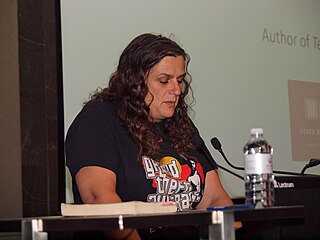Lianna Rose is an Australian singer–songwriter.
Bulman is a town in the Northern Territory of Australia. It is 400km from Darwin. Along with the Aboriginal community of Weemol, 5 km (3 mi) away, Bulman is considered a closed community meaning all visitors require a permit from the Northern Land Council to transit or visit the town. The combined population of Bulman and Weemol at the 2011 census was 291 and is one of few significant settlements on the Central Arnhem Road between Katherine and Nhulunbuy. Facilities in the town include a school, health clinic, police station and an all weather airstrip. Languages spoken in Bulman include Kriol, English and Rembarrnga.
Killarney Station is a pastoral lease that operates as a cattle station in the Victoria River District of the Northern Territory of Australia. The property is situated approximately 150 kilometres (93 mi) south east of Timber Creek and 430 kilometres (267 mi) south of Darwin.
Emungalan is a suburb in the town of Katherine, Northern Territory, Australia. It is within the Katherine Town Council local government area. The name Emungalan is believed to come from an Aboriginal word meaning "Place of Stone" or "Stony". The area was officially defined as a suburb in April 2007, adopting the name from the former railhead settlement north of the Katherine River.

Arltunga Historical Reserve, known also as Arnerre-ntyenge is a deserted gold rush town located in the Northern Territory of Australia in the locality of Hart about 110 kilometres (68 mi) east of Alice Springs. It is on the lands of the Eastern Arrernte people who are the Traditional Owners.

Lily Ah Toy was an Australian pioneer and businesswoman famous in the Northern Territory.

Eileen Cummings is a teacher, policy and liaison officer and Indigenous leader in the Northern Territory of Australia. She is a member of the Rembarrnga Ngalakan ethnic groups. She is also a member of the 'Stolen Generation' and is an activist advocating for the well-being of living members of that group.

Ngaree Jane Ah Kit is an Australian politician, who was elected to the Northern Territory Legislative Assembly at the 2016 general election, representing the electoral division of Karama, Darwin, for the Labor Party.
Sandra Joao Nelson is an Australian politician. She successfully contested the Northern Territory Legislative Assembly seat of Katherine at the 2016 Northern Territory general election for the Labor Party. She is the first Labor member to represent the Katherine area, defeating former Deputy Chief Minister Willem Westra van Holthe. She is also the first Timorese born person to be elected to any parliament in Australia.
Charles William Tapp, best known as Bill Tapp, was a pioneer and cattleman from Killarney Station in the Northern Territory of Australia.
James Forscutt better known as Jim Forscutt, is a former Mayor of Katherine in the Northern Territory of Australia.
Marie Therese "Terry" Underwood is a best-selling Australian author who lived on a remote cattle station in the Northern Territory of Australia.

Ellen Sarah Kettle MBE was an Australian nurse and midwife who pioneered mobile health care in isolated areas of the Northern Territory of Australia.

James (Jim) Joseph Mannion was a renowned policeman and soldier who worked in the Northern Territory of Australia. He is best known for an act of bravery clearing a burning building of occupants, an act which saw him awarded a George Medal.

Claire G. Coleman is a Wirlomin-Noongar-Australian writer and poet, whose 2017 debut novel, Terra Nullius won the Norma K Hemming Award. The first draft of resulted in Coleman being awarded the State Library of Queensland's 2016 black&write! Indigenous Writing Fellowship.
Michele Winifred Castagna was a disability advocate who made a significant contribution to disability services in Alice Springs; for which she received an Order of Australia medal. She is also a former alderman with Alice Springs Town Council and served from 1984–1992.
The COVID-19 pandemic in the Northern Territory is part of the ongoing worldwide pandemic of the coronavirus disease 2019 caused by severe acute respiratory syndrome coronavirus 2.

Mayse Young OAM was an outback publican and a pioneer of the Northern Territory's hospitality industry. She ran pubs in Pine Creek, Katherine and Darwin.

The Murranji Track or Murranji Stock Route is a stock route in the Northern Territory of Australia and it runs between Newcastle Waters and Top Springs. The track was primarily operational between 1904 to the late 1960s and it attracted descriptions as the "ghost road of the Drovers" and the "death track". It was used as an entry point to the Barkly Tableland and it is nearby to Wave Hill, Auvergne and Victoria River Downs Stations.

The Mick (Michael) Daly and Mary (Gladys) Namagu were an interracial couple in the Northern Territory of Australia who faced discrimination when they sought to marry in 1959. They were refused permission to marry by Government officials, including the then Director of Welfare Harry Giese, and their plight was covered nationally and sparked public sympathy. Australian federal and state politicians became involved in their case and it attracted the attention of the United Nations.










